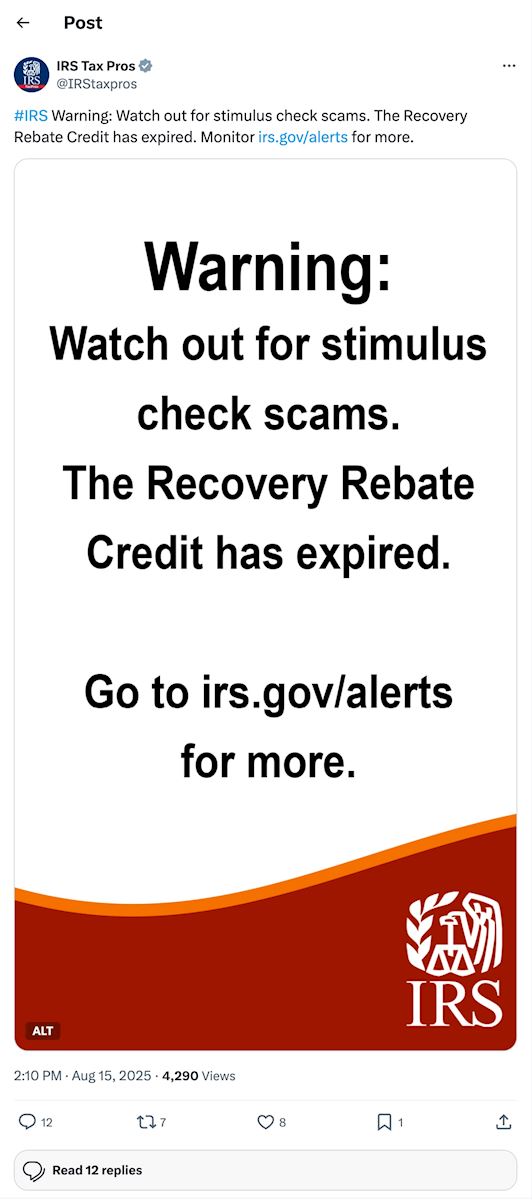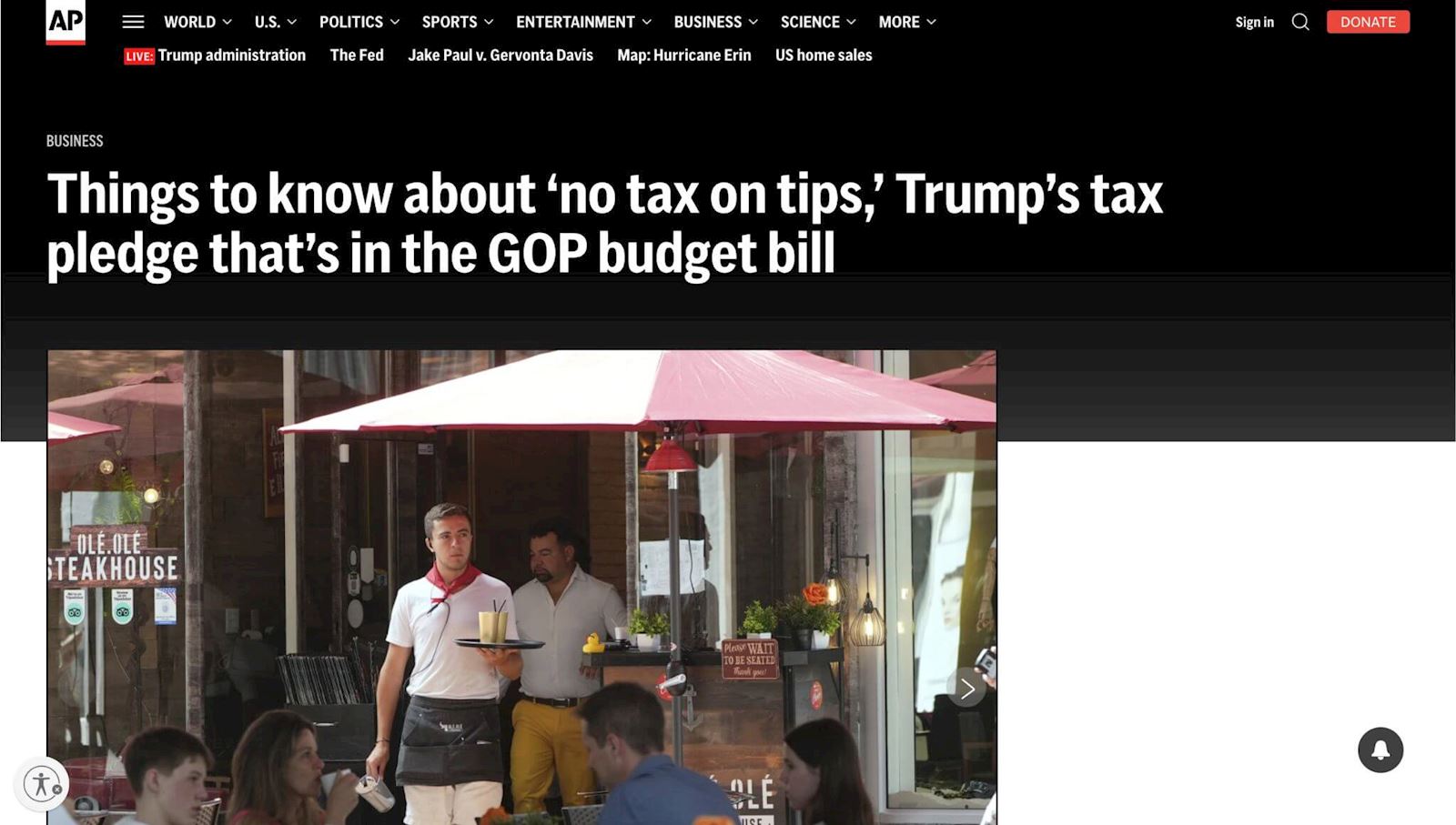Did you happen to catch that post floating around social media last week about 1.39K stimulus checks being mailed out? The post got shared and reshared like wildfire… but here’s the thing: it wasn’t true.
The IRS had to step in on their official X account and post a warning:

That’s the tricky part about tax news online. It’s easy to get swept up into confusion – or worse – because of a misleading headline or viral post.
That’s why I take seriously the responsibility of helping you sort fact from fiction. So, if you’ve got questions about what’s true, what’s rumor, and what it all really means for your tax situation, let’s talk: 414-325-2040
Speaking of headlines… there’s another popular one you’ve probably seen: “No tax on tips.”
The truth is, it’s not as simple as it seems at first glance. And that’s exactly what I want to unpack for you today: what this change actually does (and doesn’t) mean for your wallet.
Milwaukee Tipped Workers: What Does No Tax On Tips Really Mean?
“The measure of intelligence is the ability to change.” —Albert Einstein
Quick Answers for Milwaukee Tipped Workers: What Does No Tax On Tips Really Mean For My Wallet?
- You can deduct up to 25K in qualified tips from your federal taxable income (2025–2028).
- Social Security (6.2 percent) and Medicare (1.45 percent) taxes still apply.
- Only voluntary tips count. Mandatory service charges don’t qualify.
- The deduction phases out if your MAGI exceeds 150k (single) or 300k (joint).
You’ve probably seen the headlines touting “No Tax on Tips.” Sounds great, right? Like suddenly, all those hard-earned tips are yours, free and clear.
(Here’s just one example I came across:)

And yes, the One Big Beautiful Bill Act (OBBBA) does bring a major new tax break for Milwaukee tipped workers.
But it doesn’t mean your tips are totally tax-free.
My job? To cut through the noise and clarify what this new rule doesn’t mean. And, show you how it can put money back in your pocket. Let’s get into it…
.jpg)
What “No Tax on Tips” Doesn’t Mean
1. It doesn’t mean no FICA taxes.
Tips are still subject to Social Security (6.2 percent) up to the annual wage base (176.1K for 2025) and Medicare (1.45 percent) on all wages. For higher earners, the Additional Medicare Tax (0.9 percent) still applies on wages over 200k.
2. It’s not forever.
This deduction applies only for tax years 2025–2028. After that, it expires (unless Congress renews it).
3. It’s not for ALL tips or ALL workers.
The deduction is for voluntary tips only. If the Southeastern Wisconsin restaurant you work for adds an automatic 20 percent service charge for large parties, that’s not a qualifying tip.
And, you must work in a job that “customarily and regularly receives tips” (the IRS will release its official list of qualifying occupations by October 2, 2025). Professions in a Specified Service Trade or Business (SSTB) won’t be eligible for the deduction. That includes accounting, health care, law, consulting, etc. (For a full list of what qualifies as an SSTB, check here.)
Income limits apply too. Above 150k (single) or 300k (joint) MAGI, the deduction phases out.
So, What Does “No Tax on Tips” Actually Mean?
Cut and dry: it means you can deduct up to 25K in qualified tips annually against your federal taxable income.
For example, say you report 40K in tips. If you’re in the 12 percent bracket, that’s 3K in federal tax savings (25,000 × 12 percent). If you’re in the 22 percent bracket, that same deduction could save you a whopping 5.5K.
And because this is an above-the-line deduction, it lowers your Adjusted Gross Income (AGI). Which can make you eligible for other credits and deductions (education credits, child tax credit phase-ins, or even IRA contribution deductibility). It’s available whether you take the standard deduction or itemize.
How Do I Maximize the Benefit of “No Tax on Tips”?
Here’s how I’m suggesting you make the most of this new law:
→ Report every tip, every time. The higher your reported tips (up to 25k), the more you can deduct.
→ Keep your own log. A spreadsheet or app (Tipsee and ServerLife are some options) with date, shift, and tip amount gives you a backup. Even jotting notes in your phone after each shift counts — it doesn’t need to be complicated.
→ Monitor your income. If you’re nearing the 150k/300k MAGI phase-out, we need to talk strategy.
→ Think long-term. Use this temporary benefit to boost savings (like your emergency fund, debt payoff, or a down payment) before it disappears in 2029.
FAQ
“Does ‘no taxes on tips’ apply to state income taxes too?”
Not necessarily. Some states automatically conform to federal law. Others do not. We’ll need to check your specific state rules.
“Do mandatory service charges count as tips?”
No, only voluntary tips qualify. Mandatory service charges are treated as regular wages and don’t count toward the 25k deduction.
“If my employer takes credit card fees out of tips, does that lower my deduction?”
No. The deduction applies to your reported tip income before credit card fees. Employers may withhold fees, but your deduction is based on gross tips.
“If I make over 150k/300k, do I lose the deduction completely?”
No, but it phases out. The closer you are to the threshold, the smaller the benefit. Strategic planning (deferrals, retirement contributions) can help preserve eligibility.
“Can I get a refund for past years’ tips?”
No. The no taxes on tips ruling applies to tips received as of January 1, 2025. Prior years are not eligible.
What this means for you
While “No Taxes on Tips” might not be as simple as you thought, it’s still a big win. This new deduction could mean thousands of dollars in savings each year, if you play it right.
And my aim is to help you navigate the nuance: what counts, what doesn’t, and how to make sure your hard work translates into tangible tax savings. Let’s review your tip income together and calculate exactly how much this law could save you this year:
414-325-2040
Helping you capture every dollar you can,
Jon Neal

